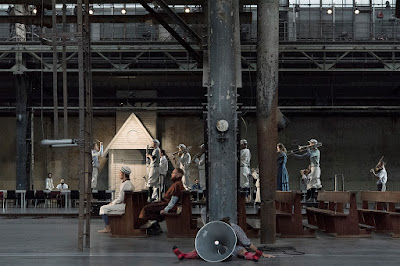A
Question of Aesthetics?
When the cinema has continued
its slow death-march towards its future as a mostly monoform corporate entity infected
by the monotonous soap-opera of television - where images are no longer
designed but merely observed as part of a mundane system of illustration - or
worse, suggestive of second-hand video gameplay, sans interactivity - where the
imagery is just an inert mass of pixels and rendered objects that are
dehumanised and depersonalised to the point of no longer expressing anything inspired
or unique - what physical art-spaces will maintain the power to occupy our
dreams?
Recently, when browsing the
internet, I happened across a series of images attributed to the noted costume
and stage designer Anna Viebrock. These images had been posted in a Facebook group
created for admirers of post-dramatic theatre, which I follow occasionally, when
in need of inspiration. Seeing these images set off a lightning bolt that tore
through my imagination. They lit a spark of excitement that smouldered into the
first giddy embers of a raging inferno, as the use of the architectural space -
its depth and perspective; that geometry of intersecting lines and the
placement of figures within staged 'frame' - and the play of light and colour,
was immensely satisfying, both on a level of aesthetic design, but also in the
composition of the accompanying photographs by Walter Mair and Tanja Dorendorf,
among others.
Immediately, I felt the
need to search out other examples of Viebrock's work and very quickly found the
following images on her official website. Once again I was left overwhelmed by
the beauty of the staging and the way the respective photographers had accentuated
it to make the designs appear all the more expressive, intelligent and
startling. Where the imagery of the modern cinema is so often generic,
second-hand and presentational, this imagery speaks to something that is difficult
to express, but which seems exciting, creative and new.
Tessa Blomstedt gibt nicht
auf [Volksbühne Berlin, 15.10.2014]:
Image credit:
http://annaviebrock.de/media.html | © Walter Mair
Universe, Incomplete
[Ruhrtriennale, 17.8.2018]:
Image credit:
http://annaviebrock.de/media.html | © Walter Mair
44 Harmonies from
Apartment House 1776 [Schauspielhaus Zürich, 5.12.2018]:
Image credit:
http://annaviebrock.de/media.html | © Tanja Dorendorf
Wunderzaichen [Staatsoper
Stuttgart, 2.3.2014]:
Image credit:
http://annaviebrock.de/media.html | © Walter Mair
Les Contes d'Hoffmann
[Teatro Real Madrid, 17.5.2014]:
Image credit:
http://annaviebrock.de/media.html | © Walter Mair
The closest the modern
cinema has come to imagery like this is in Peter Greenaway's last masterpiece, Goltzius
and the Pelican Company (2012), and in the late-period films of Roy Andersson,
for instance the recent A Pigeon Sat on a Branch Reflecting on Existence (2014).
However, the worlds and imagery created for those films are at the same time
less tangible, as they're separated by the screen. With theatre, there's the
sense that you could reach out and touch the surface of these worlds - to feel
the bare wood or the dried paint on each facade - or step inside the frame and
walk around it; hearing your own voice projected out across an auditorium.
Confined as I am to a beautiful but rural part of the country, I'm denied the privilege
of modern, cosmopolitan and creative theatre like this; however, looking at the images of Viebrock's work creates an
impression of how extraordinary it must be to be faced by designs of this scale
and intelligence.
At a time when most cinema
is so boring that its audiences barely leave the house to go and see it, the
aesthetic majesty of these productions, as captured in the beautiful compositions
of their photographers, makes me want to take on a second job to supplement my
miniscule income. That way I could afford to board a boat or plane, and could
travel to parts of the world where such theatre is possible and where such
imagery still exists.















